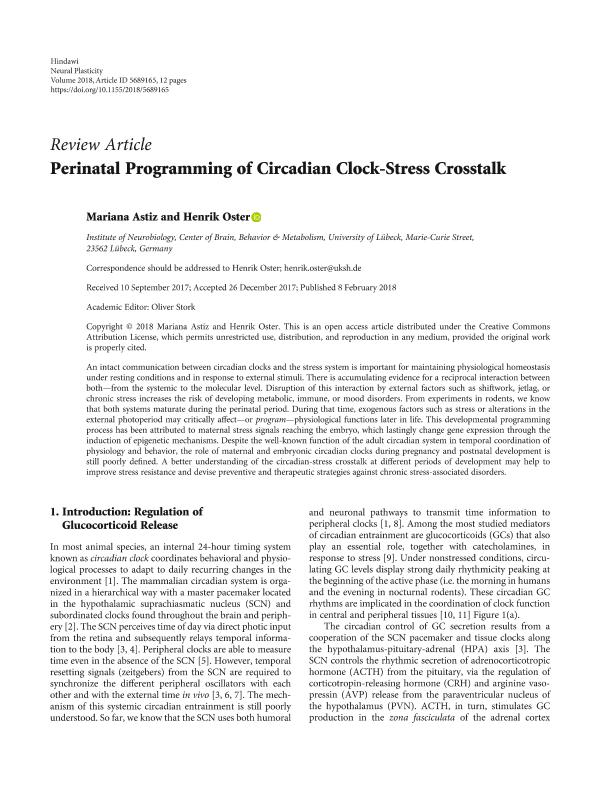Mostrar el registro sencillo del ítem
dc.contributor.author
Astiz, Mariana

dc.contributor.author
Oster, Henrik
dc.date.available
2020-02-04T20:24:01Z
dc.date.issued
2018-02
dc.identifier.citation
Astiz, Mariana; Oster, Henrik; Perinatal Programming of Circadian Clock-Stress Crosstalk; Hindawi Publishing Corporation; Neural Plasticity; 2018; 2-2018; 1-12
dc.identifier.issn
2090-5904
dc.identifier.uri
http://hdl.handle.net/11336/96709
dc.description.abstract
An intact communication between circadian clocks and the stress system is important for maintaining physiological homeostasis under resting conditions and in response to external stimuli. There is accumulating evidence for a reciprocal interaction between both - from the systemic to the molecular level. Disruption of this interaction by external factors such as shiftwork, jetlag, or chronic stress increases the risk of developing metabolic, immune, or mood disorders. From experiments in rodents, we know that both systems maturate during the perinatal period. During that time, exogenous factors such as stress or alterations in the external photoperiod may critically affect - or program - physiological functions later in life. This developmental programming process has been attributed to maternal stress signals reaching the embryo, which lastingly change gene expression through the induction of epigenetic mechanisms. Despite the well-known function of the adult circadian system in temporal coordination of physiology and behavior, the role of maternal and embryonic circadian clocks during pregnancy and postnatal development is still poorly defined. A better understanding of the circadian-stress crosstalk at different periods of development may help to improve stress resistance and devise preventive and therapeutic strategies against chronic stress-associated disorders.
dc.format
application/pdf
dc.language.iso
eng
dc.publisher
Hindawi Publishing Corporation

dc.rights
info:eu-repo/semantics/openAccess
dc.rights.uri
https://creativecommons.org/licenses/by/2.5/ar/
dc.subject
development
dc.subject
circadian clock
dc.subject
stress axis
dc.subject
programming
dc.subject.classification
Biología del Desarrollo

dc.subject.classification
Ciencias Biológicas

dc.subject.classification
CIENCIAS NATURALES Y EXACTAS

dc.title
Perinatal Programming of Circadian Clock-Stress Crosstalk
dc.type
info:eu-repo/semantics/article
dc.type
info:ar-repo/semantics/artículo
dc.type
info:eu-repo/semantics/publishedVersion
dc.date.updated
2019-10-18T19:05:25Z
dc.identifier.eissn
1687-5443
dc.journal.volume
2018
dc.journal.pagination
1-12
dc.journal.pais
Egipto

dc.journal.ciudad
El Cairo
dc.description.fil
Fil: Astiz, Mariana. Universität zu Lübeck; Alemania. Consejo Nacional de Investigaciones Científicas y Técnicas. Centro Científico Tecnológico Conicet - La Plata. Instituto de Investigaciones Bioquímicas de La Plata "Prof. Dr. Rodolfo R. Brenner". Universidad Nacional de la Plata. Facultad de Ciencias Médicas. Instituto de Investigaciones Bioquímicas de La Plata "Prof. Dr. Rodolfo R. Brenner"; Argentina
dc.description.fil
Fil: Oster, Henrik. Universität zu Lübeck; Alemania
dc.journal.title
Neural Plasticity
dc.relation.alternativeid
info:eu-repo/semantics/altIdentifier/url/https://www.hindawi.com/journals/np/2018/5689165/
dc.relation.alternativeid
info:eu-repo/semantics/altIdentifier/doi/http://dx.doi.org/10.1155/2018/5689165
Archivos asociados
